Initial Research on Abacus Mental Arithmetic Education
In Enlightening Children’s Intelligence
--------Liu Lizhu, Dai Lanyu, Fan Kaihui, Zhong Shisheng and Zhao Licheng--------
Shihezi, Xinjiang Province, China
Abacus Mental Arithmetic, by the direct image of abacus, according to the mode of abacus computation, through various sense organs as ears (listening), eyes (seeing), mount (talking), limbs (reckoning), brain (thinking) and with the perception of abacus image and reckoning process is a calculation skill of the whole calculation process reflecting in the brain?building the corresponding abacus image and calculating numbers and quantity in fast speed and high efficiency with “mental abacus” in brain. Learning of Abacus Mental Arithmetic is a new teaching method which makes the abacus-based teaching as its foundation and mainstream and combines the abacus computation?oral calculation and written calculation to form a skill of Abacus Mental Arithmetic. In order to probe the potential intelligence and education functions of teaching of Abacus Mental Arithmetic, we have made tracking experimental researches for nine years from 1996 to 2005. The results are as follows:
?. Objects and Methods
(1). Objects
- Primary school: In six classes of grade one of First Primary School, Xinjiang Province, enrolled in 1996, selected five classes at random as experimental classes to learn Abacus Mental Arithmetic; three classes and six classes were the respective corresponding classes; total 181 students, including 65 students in experimental classes featuring on learning Abacus Mental Arithmetic, were our tracking research objects. There were 158 students, including 62 students in experimental classes of Abacus Mental Arithmetic, graduated in year 2002.
- Secondary School: Continue to assemble the 56 students in experimental class of Abacus Mental Arithmetic enrolled to Shihezi First Secondary School, Xinjiang Province, China, as an experimental class and other students at the same grade as the corresponding classes to tracking research.
(2). Methods
Intelligence Quotient determination applies to the Associative Ruiwen Intelligence Test Scale? Scale and Clinical Memory Scale for nation-wide use and modified by our country. Primary and secondary students’ non-intellectual factor is determined with Eysenck Personality Qualification (EPQ) edited by Non-intellectual factor and Research Project Association Team. All the experimenters are trained in the National Psychological Test Class and achieved the certificate.
The Abacus Mental Arithmetic teachers are the professional teachers who are designated by Shihezi Abacus Computation Association and qualified in the National Teaching Training; they teach Abacus Mental Arithmetic according to teaching method of the specific materials appointed by Chinese Abacus Computation Association. Grade one from primary school has two periods per day, grade two has one period per day, grade three has four periods per week, grade four has two periods pre week, grade five and grade six has one period per week. The research makes building abacus image in brain without abacus as the successful standard.
The match method choose the forty-five students who can figure out more than 15 rows in two-digit numbers in experimental class; with the accordance of sex, mother’s literature extent, feeding way in suckling period, the age difference within six months, equal in ‘Chinese words’ recognized in preschool, basic intelligence quotient difference within ten as the foundation,![]() in the two corresponding classes, match with 1: 1 and there are 33 matches.
in the two corresponding classes, match with 1: 1 and there are 33 matches.
This research pays attention to the standardization of disposal factors?test objects and experimental effects and reflects three principles of contrast?random and repeat and makes uses of blind trial too.
(3). Content
This project started the teachers training for Abacus Mental Arithmetic from 1996 to 1997 and drew out the teaching programs and operation methods and established the Abacus Mental Arithmetic Intelligence Development Research Team; They carried on subject design and report to Science Committee; investigated and collected the data that influenced primary students’ intelligence and carried on the 1st Ruiwen Intelligence Test and published the “Multi-factors analysis on influencing primary students’ intelligence” and won prize.
This project started the 2nd?3rd?4th and 5th Ruiwen Intelligence Test from 1998 to 2001 and developed children match?reading ability test?Wechsler Children Intelligence Test?Clinical Memory Scale Test and Eysenck Personality Test; collecting study performances of each semester; the effect of learning of Abacus Mental Arithmetic on primary students’ reading ability; the effect of Learning of Abacus Mental Arithmetic on primary students’ intelligence and short-time memory; analysis on the effect of Learning of Abacus Mental Arithmetic on primary students’ memory extent; pre-research on the effect of Learning of Abacus Mental Arithmetic on intelligence; experimental research on the effect of Learning of Abacus Mental Arithmetic on children’s intelligence etc. This project won the 1st prize of Shihezi Science Progress and 3rd prize of Corps Science Progress in 2001.
This project started the tests of concentration power?non-intellectual factors and writing ability from 2002 to 2005 and started to collect their study performances of each semester and prizes data.
?. Results Analysis
(1). Enhancement of Intelligence produced by Learning of Abacus Mental Arithmetic
- The results of Ruiwen Intelligence Test



The intelligence quotient variable condition through tracking the experimental class featuring on Abacus Mental Arithmetic and corresponding class for succession
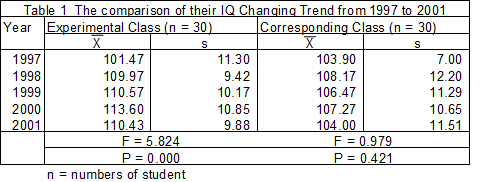

The 1st surveyed intelligence quotient (before learning of Abacus Mental Arithmetic) in year 1997, experimental class is 101.47, while corresponding class is 103.90; the gap is not obvious (P>0.05). Through five years’ learning of Abacus Mental Arithmetic, the intelligence quotient in experimental class increases 9.67 on an average while the intelligence quotient in corresponding class increases 2.57 on an average; the average intelligence quotient in experimental class is increasing with the increasing of learning period, but the intelligence quotient increasing tendency in corresponding class is not obvious.
The gap of the two intelligence quotients in 1st and 2nd year is not obvious, but from the 3rd year (1999), the intelligence increasing value in experimental class featuring on Abacus Mental Arithmetic is obviously higher than that in corresponding class.
- The result of Wechsler Intelligence Test


- The general intelligence quotient and language intelligence quotient in experimental class featuring on Abacus Mental Arithmetic is higher than that in corresponding class while the difference of operational intelligence quotient is not obvious (as shown in table 3).

- The influence produced by learning of Abacus Mental Arithmetic on students’ short-time memory (shown in table 4).
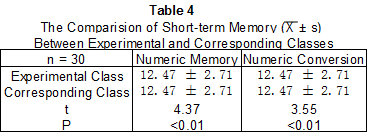
The memory extent of students who have received the teaching of Abacus Mental Arithmetic is largely increased. The extent of memory power on sequence-numbers is obviously increased in the experimental class featuring on Abacus Mental Arithmetic to 8---9 digits (8.7 digits on average), higher than that of 7—8 digits (7.8 digits on average) in corresponding class; t = 2.569, P< 0.05; the extent of memory power on reverse numbers in the experimental class featuring on Abacus Mental Arithmetic is 5—6 digits (5.7 digits on average), higher than that of 4—5 digits (4.6 digits on average) in corresponding class; t = 4.081, P< 0.01. The tests of short-team memorizing numbers and conversion of number code in the experimental class featuring on Abacus Mental Arithmetic is obviously higher than that in corresponding class too.
(2). Educational function produced by Learning of Abacus Mental Arithmetic
- The compare of the average scores of language and mathematics between experimental class featuring on Abacus Mental Arithmetic and corresponding class during the 12 semesters in primary school (shown in Table 5).
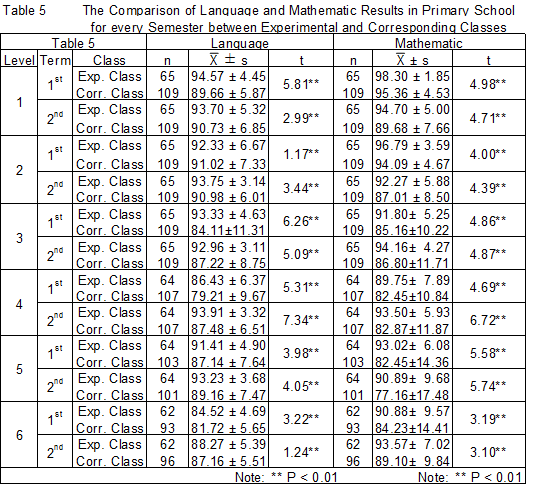
The average language score of students in experimental class featuring on Abacus Mental Arithmetic is obviously 4.40 higher than that in corresponding class, each semester except in the 1st semester of grade two from primary school and the 2nd semester of grade six in primary school, the difference between these two classes is not obviously. Mathematics performance that is especially prominent for the average score in experimental class is 6.94 higher than that in corresponding class. The comprehensive examinations (including discipline?sanitary?study?sports?labor?activity and etc.) the experimental class featuring on Abacus Mental Arithmetic for each semester is always ranked the front of the same grade and rewarded the best three classes every year.
- The compare of the average scores of each subject between experimental class featuring on Abacus Mental Arithmetic and corresponding class during six semesters in Secondary School (shown in Table 6).
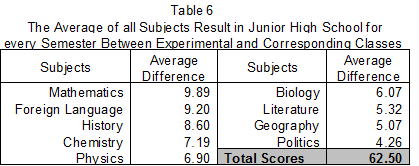
The average and total score in mathematics foreign language?physics and chemistry of students in experimental class featuring on Abacus Mental Arithmetic is obviously higher than that in corresponding class, except once in literature?once in biology?once in history?twice in geography and four times in politics each semester. The different higher average scores in each subject in experimental class featuring on Abacus Mental Arithmetic than that in corresponding class separately are: 9.89 scores in mathematics, 9.20 scores in foreign language, 8.60 scores in history, 7.19 scores in chemistry, 6.90 scores in physics, 6.07 scores in biology, 5.32 scores in literature and language, 5.07 scores in geography, 4.26 scores in politics and 62.50 scores in total.
- The effect produced by Learning of Abacus Mental Arithmetic on students’ reading ability
 (shown in Table 7).
(shown in Table 7).
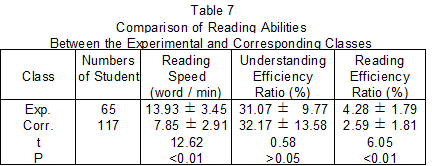
According to “speed reading by time”, in the test of reading ability in experimental class featuring on Abacus Mental Arithmetic and in two corresponding classes of students in grade four (primary school), the reading speed of students in experimental class is 13.93 words per second, obviously faster than the students in corresponding class of 7.85 words per second. Their reading efficiency is obviously higher than the students in corresponding class. There is no difference between them in comprehension efficiency (the function of left hemisphere).
Read the reports on compare of other scores in each semester of Secondary School in tables 8, 9 and 10.
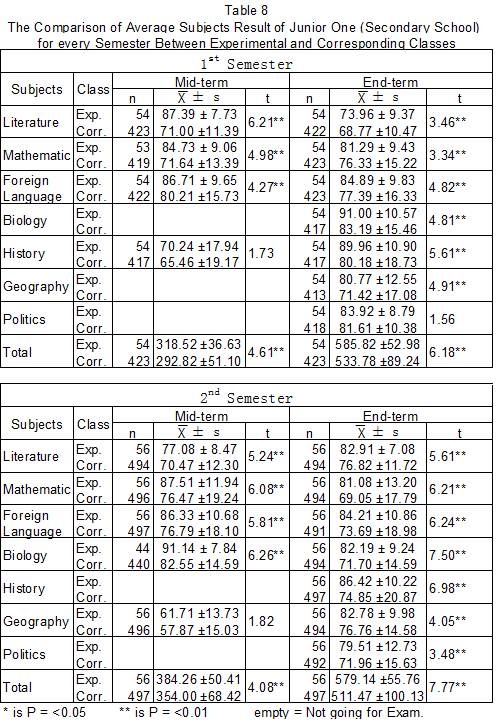
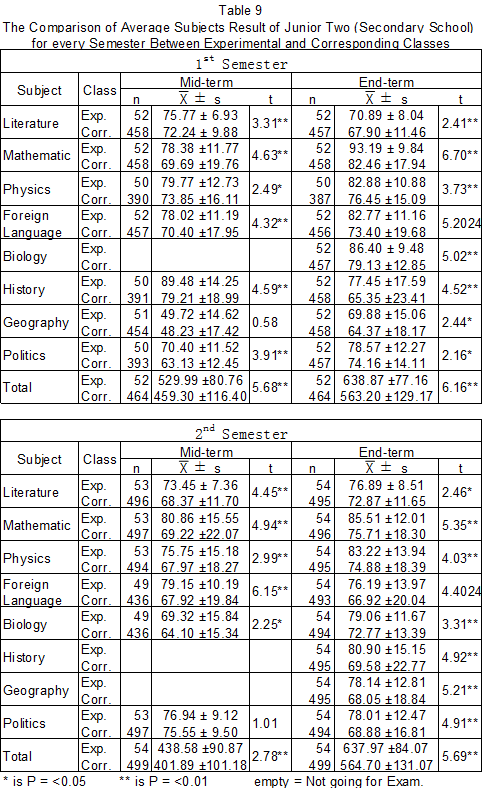
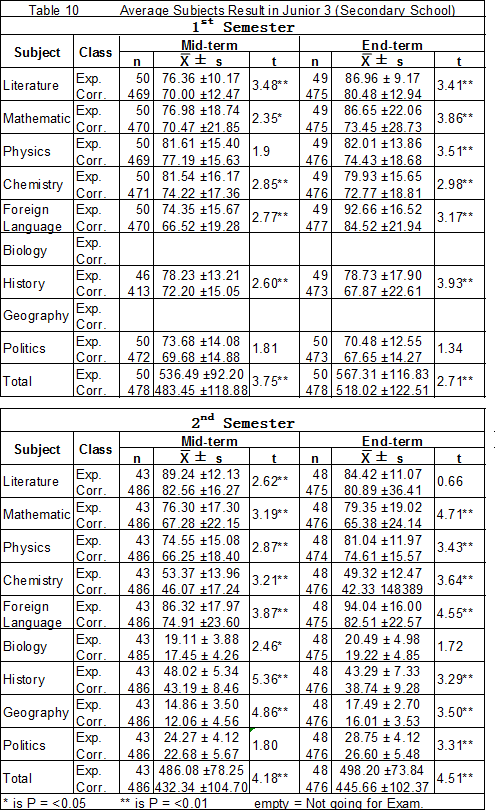
- The effect produced by Learning of Abacus Mental Arithmetic on students’ writing ability (shown in Table 11).

The literature teachers employed from education bureau, under not knowing the situation of experimental class and corresponding class, evaluate the grade of their composition of “×× in the future” in graduation examination from primary school in content?language?structure and writing. The excellent rate in experimental class featuring on Abacus Mental Arithmetic is obviously higher than that in corresponding class and the fine rate in experimental class reaches 50.79%.
- The achievement of Abacus Mental Arithmetic contest and its popularization. Between 1997 and 2004, the players in experimental class featuring on Abacus Mental Arithmetic and intensive training team of Abacus Mental Arithmetic awarded 37 grand prizes in Abacus Mental Arithmetic contest of international?national?autonomous region?corps and Shihezi; The Shihezi Abacus Association won awards for Advanced Group of China Abacus Association?Advanced Group of Abacus Technical Grade Evaluation?Advanced Group of Abacus Construction in autonomous region and corps?Advanced Group of Institute Construction etc.
During the recent years, Shihezi Abacus Association set up a Training School Featuring on Abacus Mental Arithmetic? Training Base of Learning of Abacus Mental Arithmetic Corps Teachers Training Base of Abacus Mental Arithmetic; organized 15 terms on teachers training class to train totally 630 teachers and 20 thousand students from 30 kindergartens and 10 primary schools to learn Abacus Mental Arithmetic. The popularization rate of Abacus Mental Arithmetic in Government kindergartens reaches 90% and that in primary school reaches 80% (shown in Table 12)

- The effect produced by Learning of Abacus Mental Arithmetic on non-intellectual factor (shown in Table 13).
In the non-intellectual factor test of students in grade six from primary school in experimental class featuring on Abacus Mental Arithmetic and corresponding class, except the emotional stability of girls in experimental class is higher than that in corresponding class, there is no obvious difference in twelve factors and total scores between two kinds of class.
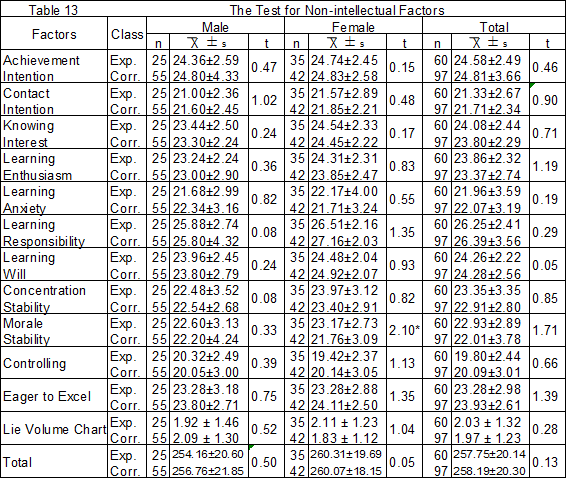
In the Eysenck Personality Test of the students in grade five from primary school, there is no obvious difference in four factors between two kinds of class.
?. Experimental Conclusion
(1). Learning of Abacus Mental Arithmetic can obviously enhance the students’ intelligence quotient
Through five-year’s Learning of Abacus Mental Arithmetic, the average intelligence quotient of students in experimental class featuring on Abacus Mental Arithmetic raises from 101 to 110-113 with the average increase of 9.67 and obviously 2.57 higher than that in corresponding class, which indicates that Learning of Abacus Mental Arithmetic can speed up the children’s intelligence development and enhance their intelligence level. The brain cells in dispersed state can only be transferred to systematical cell mass which has been divided in structure and has complete function in a new level and can recognize?memorize and think through the repeat communication (stimulation) with environment and therefore forms a specific function zone![]() . Students can master the basic skill of abacus computation through learning the reckoning operation; at the same time, they can acquire the “supplement” and “combination” rule in the “transitional learning” of reckoning operation and can also use freely in mental process (dynamic bead-picture in brain). In this process, many sense and sport organs of eyes?ears?mouth and hands participate in and the nerve centre in brain receives stimulation to form a specific function zone of abacus computation. Make full use of teaching tools and learning tools to effectively cultivate and develop brain’s imaginable thinking and logical thinking powers so that to promote the accord development of the thinking ability of students’ left and right hemispheres. It can be seen obviously that the learning process of Abacus Mental Arithmetic is an objective?motile practical activity and an indispensable “direct base” of intelligence development. This practical activity cultivates and enhances the students’ intelligence; while the students in corresponding class lack of this learning practical process so their intelligence development can not be promoted obviously. The intelligence difference is mainly due to the different education environment. Therefore, Learning of Abacus Mental Arithmetic is an active and positive educational measure which can promote the internal change of primary students’ intelligence and is an effective way for intelligence development. As the Professor Hong DeHou, the famous national psychological expert said for the evaluation of this research result: “Carrying out teaching of Abacus Mental Arithmetic in primary students can perfectly enhance their intelligence level and the enhancement of its extent is far more obvious than the achievement of other conventional teaching.”
. Students can master the basic skill of abacus computation through learning the reckoning operation; at the same time, they can acquire the “supplement” and “combination” rule in the “transitional learning” of reckoning operation and can also use freely in mental process (dynamic bead-picture in brain). In this process, many sense and sport organs of eyes?ears?mouth and hands participate in and the nerve centre in brain receives stimulation to form a specific function zone of abacus computation. Make full use of teaching tools and learning tools to effectively cultivate and develop brain’s imaginable thinking and logical thinking powers so that to promote the accord development of the thinking ability of students’ left and right hemispheres. It can be seen obviously that the learning process of Abacus Mental Arithmetic is an objective?motile practical activity and an indispensable “direct base” of intelligence development. This practical activity cultivates and enhances the students’ intelligence; while the students in corresponding class lack of this learning practical process so their intelligence development can not be promoted obviously. The intelligence difference is mainly due to the different education environment. Therefore, Learning of Abacus Mental Arithmetic is an active and positive educational measure which can promote the internal change of primary students’ intelligence and is an effective way for intelligence development. As the Professor Hong DeHou, the famous national psychological expert said for the evaluation of this research result: “Carrying out teaching of Abacus Mental Arithmetic in primary students can perfectly enhance their intelligence level and the enhancement of its extent is far more obvious than the achievement of other conventional teaching.”
(2). Learning of Abacus Mental Arithmetic can increase students’ short-term memory capacity
The general intelligence quotient and language intelligence quotient obtained by Wechsler Intelligence Test in experimental class featuring on Abacus Mental Arithmetic are obviously higher than that in corresponding class, especially in the memory span of backward and forward reciting the numbers, the experimental class can recite more digits than that in corresponding class. Memory is not only a fundamental measure of accumulating knowledge and experience and the base of study but also an important aspect in intelligence development. It can be divided into short-term memory and long-term memory according to the time of information storage. Short-term memory can convert into long-term memory through repeated processing and it has a certain capacity. Prof. Hong DeHou pointed out: “The research has breakthrough for some traditional concepts and views in some aspects. For example, in terms of memory psychology, it is commonly considered that the short-term memory span is difficult to rise in a large extent through teaching during some age group. But this research points out that the short-term memory span of children of age before 12 years rises obviously through studying Abacus Mental Arithmetic for a period of 3 to 5 years, which largely expands the capacity of short-term memory accepting information. This is a wonderful theoretical acquisition.”
(3). Learning of Abacus Mental Arithmetic receives the effect of experimenting one subject and benefiting several subjects
Through comparing analysis of studying achievement of each subject and comprehensive achievements during 18 semesters for successive 9 years, it is fully proved the function of the Abacus Mental Arithmetic Education. The students in experimental class win wonderful achievement of each subject, especially the mathematics achievement; the mathematics score in primary experimental class is 6.94 higher than that in corresponding class, Secondary School is 9.89 higher than the average level of the former graduates. The inner factor of Abacus Mental Arithmetic Education plays a part in numbers catching?fast response and computing power. It makes the teaching of mathematic into the culture of language and psychology, which reduces the difficulty of children studying mathematics and raises the studying interest. People are dealing with mathematics everyday in their production and life, so how important it is. Prof. Hua LuoGeng, the famous national mathematician said: “The extensive universe?micro particle?fast rocket?handy chemical industry?various planet? mysterious living creature and trivial daily affairs can not be living alone without mathematics”. Mathematics works as the base and tools and be honored as “the key to the door of science” and “the queen of natural science”, and further the Abacus Mental Arithmetic is the “golden key” to open the doors of mathematics and other subjects leading to the path of science.
Teachers generally reflect that students in experimental class have concentrated their attention?good memory?vigorous though?fast response?active statement? high studying efficiency and strong comprehensive quality. Therefore, Learning of Abacus Mental Arithmetic is the simple and effective way to implement education for all-round development.
(4). Learning of Abacus Mental Arithmetic can raise students’ reading and writing ability
Reading is a complicated, comprehensive and basic intelligent ability, which is an important measure for people dealing with information and obtaining knowledge and also a prior condition of winning success of study. The developing process of reading ability is also a developing process of observation?memory?imagination and thinking abilities as analysis?synthesis?abstract?summarization?logical thinking etc., while the Learning of Abacus Mental Arithmetic effectively promotes the development of thinking and fully gives place to thinking potentiality. Reading efficiency?reading speed and comprehensive extent is an important indicator to measure the reading ability. Today’s society has entering information age, so to keep pace with the age, speed up the information flow-rate and increase information capacity must raise the reading speed and efficiency effectively. The reading speed and efficiency in experimental class featuring on Abacus Mental Arithmetic are higher again than that in corresponding class and also higher than general reading speed,(9) which indicates that Learning of Abacus Mental Arithmetic plays a driving role in the enhancement of reading ability.
Contest is the product that brain processes thinking after recognizing objective things and the result that brain expresses thinking process in written form; Language is related to thinking directly and inseparable from it; it records the result of thinking activity and achievement of recognition activity with words and sentence and further consolidates them, which makes the possibility of thinking communication in human society. The composition of “×× in the future” helps students fully expanding their imagination, which is the thinking process of creating new imagines with the storing impression or perceptive materials in brain. Often observation and good memory is the base to raise imagination and also the premise to make a good composition. The compositions of students in experimental class are rich in imagination?unique in form?full in content?exact and fluent in language?complete in structure?clear in level?round in writing?correct in format and more than half of students achieve excellent scores higher than that in corresponding class, which is in accordance with the result of Wechsler intelligence test.”
(5). Learning of Abacus Mental Arithmetic does not influence non-intellectual factors much
Non-intellectual factors refer to the other factors except intellectual factors, including interest?motive?emotion?will?character etc., which is the combination of multi-level and multi-side psychological characteristics. The research studies that Learning of Abacus Mental Arithmetic does not influence the formation and development of non-intellectual factors much, which deserves further discuss.
Under the great support from Coordination and Assistance of Shihezi Abacus Association?Finance Bureau?Education Bureau and school, through the continuous efforts of subjects group, the tracking experimental research through 9 years has achieved an obvious achievement. A lot of scientific data proved that: Abacus Mental Arithmetic through more than twenty years’ practical development makes abacus computation developing from calculating tool into educating tool and intelligence-starting tool, which can effectively cultivate children’s imaginary thinking and logical thinking ability, promote the accord development of right and left hemispheres, develop intellectual potential and raise intellectual level. The teaching of Abacus Mental Arithmetic is successful and it is a green project according to the currently advocated implementation of quality education and promotion of children’s all-round development. It is a great undertaking of profound benefit, which makes Abacus Mental Arithmetic, as the treasure of Chinese, shining around the country as well as the world.
(Author’s unit from Xinjiang Province, China: Shihezi People’s Hospital, Shihezi Abacus Association, Shihezi Maternity & Child Health Hospital, Shihezi First Primary School and Shihezi First Secondary School)
References:
(1) Liu Lizhu, Fan Kaihui and Dai Lanyu etc.: Multi-Factors Analysis of the Effect on Primary Students’ Intelligence, copy from Health Psychology Magazine, the 8th volume of 2000, the 6th periodical.
(2) Liu Lizhu, Fan Kaihui and Dai Lanyu etc.: Experimental Research of the Effect of Learning of Abacus Mental Arithmetic on Children’s Intelligence-Start Function, copy from International Chinese Nervous and Mental Machine Magazine, the 3rd volume of 2002, the 2nd periodical, page 88.
(3) (4) Liu Lizhu, Fan Kaihui and Dai Lanyu: Pre-research of the Effect of Learning of Abacus Mental Arithmetic on Intelligence, copy from Health Psychology, the 2nd periodical of 2001, page 33.
(5) Fan Kaihui, Dai Lanyu, and Liu Lizhu etc.: The Effect on Primary Students’ Intelligence and Short-Term Memory, copy from Abacus Computation, the 4th periodical of 2001, page 15.
(6) Fan Kaihui, Dai Lanyu and Liu Lizhu: Analysis of the Effect of Learning of Abacus Mental Arithmetic on Primary Students’ Memory Span, copy from International Chinese Mental and Physical Medicine, the 1st periodical of 2001, page 24.
(7) Liu Lizhu, Fan Kaihui and Dai Lanyu etc.: The Effect of Learning of Abacus Mental Arithmetic on Children’s Reading Ability, copy from Abacus Computation, the 5th periodical of 2001, page 25.
(8) Wang Ruwen: Great Promotion of Early Education of Community Children, copy from Chinese Children’s Health, the 1st volume of 2003, the 1st periodical, page 37-38.
(9) Li Wei editing in chief: Encyclopedia of Psychology, Zhengjiang Education Press, Edition of 1996, page 514.